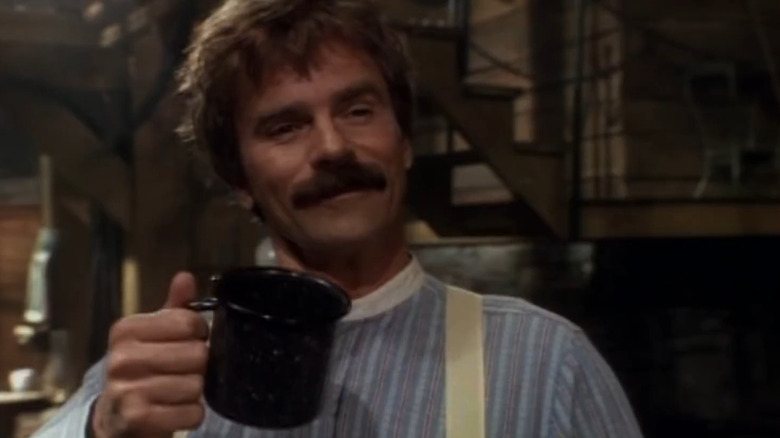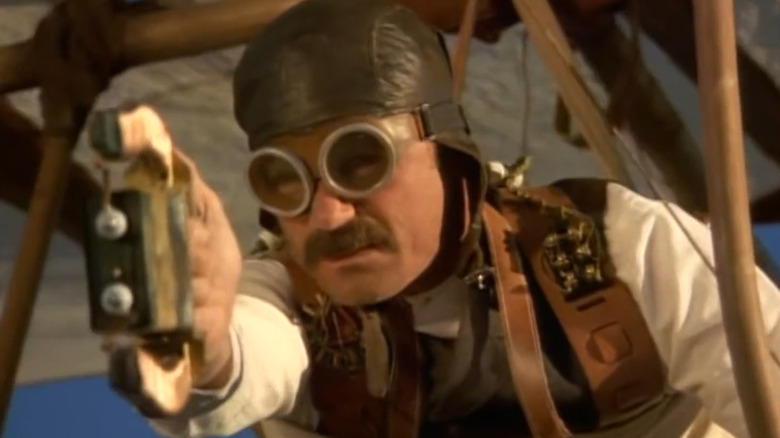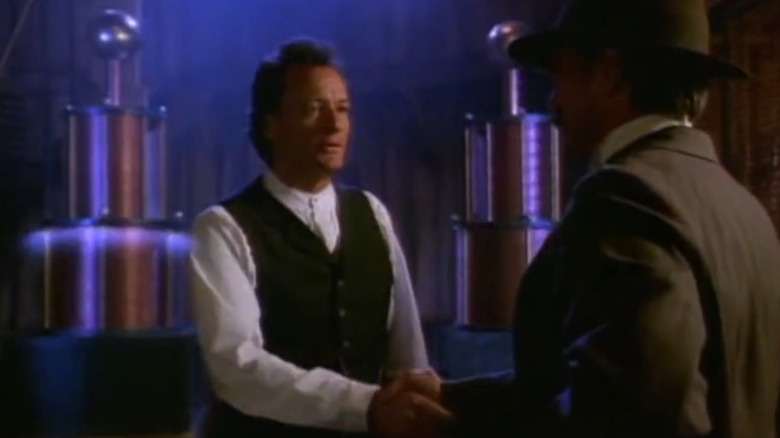Before Stargate, Richard Dean Anderson Starred In An Ambitious Sci-Fi Western Series
We may receive a commission on purchases made from links.
Richard Dean Anderson is television royalty, beginning with his first high-profile gig on "General Hospital" in 1976. He played Dr. Jeff Webber on that series, appearing in a whopping 611 episodes over five years. He also had leading roles on the short-lived shows "Seven Brides for Seven Brothers" and "Emerald Point N.A.S." before landing the lead on the hit spy series "MacGyver" in 1985. That show lasted for seven seasons and 139 episodes, cementing Anderson as one of TV's most reliable leading men. Other viewers likely know Anderson as Jack O'Neil, the military tough-guy from the long-running series "Stargate SG-1." He played the role for 173 episodes of the baseline show and would occasionally turn up on its spin-offs. Overall, the "Stargate" franchise has taken up many years of his career.
Sandwiched in the middle there, though, is an obscure 1995 Western adventure series that Anderson also played the title character in. Few remember the show "Legend," co-created by "Star Trek" luminary Michael Piller, as it wasn't terribly successful. It also came out shortly after the very similar (and equally unsuccessful) Bruce Campbell-starring "The Adventures of Brisco County, Jr." and shortly before the very similar (and slightly more successful) "Jack of All Trades." "Legend" fell into a crack in TV history, so it's really only remembered now by 1990s TV obsessives fond of sci-fi Westerns.
It's a pity, though, as "Legend" is a sweet and exciting series. It also sports a novel premise. Anderson stars as Ernest Pratt, a college-educated writer publishing novels in the late 1860s. His most popular book series centers on Nicodemus Legend, a dashing, noble adventurer/superhero who uses extraordinary gadgets to solve crimes and help people in need. Pratt, however, writes his novels in the first-person, leading readers to assume they are autobiographical.
Naturally, Pratt, a wimpy novelist, ends up finding himself in scenarios where he had to actually commit acts of technological derring-do, all while claiming to be Nicodemus Legend. His tech is provided by Janos Bartok (John de Lancie), an ousted Hungarian scientist.
Legend is a very fun, mostly forgotten series
Yes, you read that right: MacGyver himself, Richard Dean Anderson, and John de Lancie, aka Q from the "Star Trek" franchise, teamed up in the Old West to invent steampunk weapons and vehicles to fight crime. The Bartok character, while Hungarian, was clearly modeled after Nikola Tesla, and he often complained about how (Thomas) Edison stole his ideas. Do you regret missing "Legend" now? The series also featured small roles for Mark Adair-Rios and Bob Balaban, while also boasting one-episode guest spots from a who's-who of working 1990s actors, including Fionnula Flanagan, Alex Hyde-White, James Hong, Robert Englund, Ashley Laurence, and G.W. Bailey (as Ulysses Grant).
The series begins when Pratt learns that an irascible criminal has been committing acts of vigilante justice under the name of Nicodemus Legend. Pratt, wanting to clear his name and keep his literary creation pure, goes to Sheridan, Colorado to meet the impersonator, only to find it's Bartok and his assistant, Huitzilopochtli Ramos (Adair-Ross). Bartok, now meeting the "real" Nicodemus Legend, proposes they unite as a crime-fighting force. Bartok can invent the electromagnets and hang-gliders, while Pratt serves as the hero. Naturally, Pratt is reluctant, but agrees. He has recently suffered from writer's block and figures these adventures will give him new ideas.
One of the more amusing conceits of "Legend" is that Nicodemus is depicted as a lusty, womanizing, hard-drinking character that people find sexually irresistible. Pratt, however, is a straight-edge, seemingly asexual character who abhors violence in real life. Thus, a lot of "Legend" is devoted to Pratt and the others finding ways to commit vigilante justice without the aid of guns or violence (which makes them very admirable).
Legend only lasted 12 episodes
"Legend" premiered on the UPN, itself short-lived, on April 18, 1995, before going off the air after its first season came to a close a few months later on August 22. Like almost all of the shows that aired during UPN's first year, though, it got axed when there was a change of management at the company. Piller's other series, "Star Trek: Voyager," managed to stick around, but "Legend" was shoved into a grave alongside shows like "Platypus Man," "Deadly Games," "Marker," and "Pig Sty." It remains something of an obscurity today.
As mentioned, Anderson would move beyond the failure of "Legend," while de Lancie had future "Star Trek" appearances in front of him. Even Piller would survive, going on to develop the TV adaptation of Stephen King's novel "The Dead Zone." But it was a pity "Legend" had to fail. The series received mostly positive reviews, although many critics readily compared it to "The Adventures of Brisco County, Jr.," which also contained sci-fi elements. (In that case, there were time travelers and a mysterious high-tech orb.) And, to be fair, the two shows were cut from the same cloth. Indeed, they had similarly whimsical tones and focused on comically irascible yet ultimately brave heroes who turn to adventuring after being educated in the big city. Whether one prefers Richard Dean Anderson or Bruce Campbell as their leading man is a matter of preference. (But the correct answer is Campbell.)
One can purchase "Legend" on Amazon, and there are DVDs floating around on the second-hand market. It's not so obscure as to be lost, but it is largely known by only people of a very certain age. If you've watched "The Adventures of Brisco County, Jr.," and need a different flavor with some more adventure and wit, go for "Legend."


